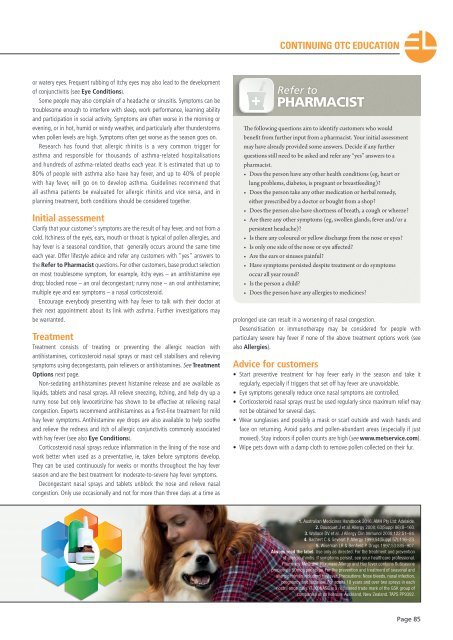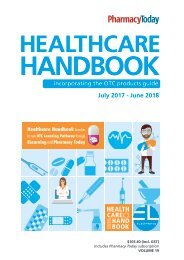2017 HCHB_digital
You also want an ePaper? Increase the reach of your titles
YUMPU automatically turns print PDFs into web optimized ePapers that Google loves.
CONTINUING OTC EDUCATION<br />
or watery eyes. Frequent rubbing of itchy eyes may also lead to the development<br />
of conjunctivitis (see Eye Conditions).<br />
Some people may also complain of a headache or sinusitis. Symptoms can be<br />
troublesome enough to interfere with sleep, work performance, learning ability<br />
and participation in social activity. Symptoms are often worse in the morning or<br />
evening, or in hot, humid or windy weather, and particularly after thunderstorms<br />
when pollen levels are high. Symptoms often get worse as the season goes on.<br />
Research has found that allergic rhinitis is a very common trigger for<br />
asthma and responsible for thousands of asthma-related hospitalisations<br />
and hundreds of asthma-related deaths each year. It is estimated that up to<br />
80% of people with asthma also have hay fever, and up to 40% of people<br />
with hay fever, will go on to develop asthma. Guidelines recommend that<br />
all asthma patients be evaluated for allergic rhinitis and vice versa, and in<br />
planning treatment, both conditions should be considered together.<br />
Initial assessment<br />
Clarify that your customer's symptoms are the result of hay fever, and not from a<br />
cold. Itchiness of the eyes, ears, mouth or throat is typical of pollen allergies, and<br />
hay fever is a seasonal condition, that generally occurs around the same time<br />
each year. Offer lifestyle advice and refer any customers with "yes" answers to<br />
the Refer to Pharmacist questions. For other customers, base product selection<br />
on most troublesome symptom, for example, itchy eyes – an antihistamine eye<br />
drop; blocked nose – an oral decongestant; runny nose – an oral antihistamine;<br />
multiple eye and ear symptoms – a nasal corticosteroid.<br />
Encourage everybody presenting with hay fever to talk with their doctor at<br />
their next appointment about its link with asthma. Further investigations may<br />
be warranted.<br />
Treatment<br />
Treatment consists of treating or preventing the allergic reaction with<br />
antihistamines, corticosteroid nasal sprays or mast cell stabilisers and relieving<br />
symptoms using decongestants, pain relievers or antihistamines. See Treatment<br />
Options next page.<br />
Non-sedating antihistamines prevent histamine release and are available as<br />
liquids, tablets and nasal sprays. All relieve sneezing, itching, and help dry up a<br />
runny nose but only levocetirizine has shown to be effective at relieving nasal<br />
congestion. Experts recommend antihistamines as a first-line treatment for mild<br />
hay fever symptoms. Antihistamine eye drops are also available to help soothe<br />
and relieve the redness and itch of allergic conjunctivitis commonly associated<br />
with hay fever (see also Eye Conditions).<br />
Corticosteroid nasal sprays reduce inflammation in the lining of the nose and<br />
work better when used as a preventative, ie, taken before symptoms develop.<br />
They can be used continuously for weeks or months throughout the hay fever<br />
season and are the best treatment for moderate-to-severe hay fever symptoms.<br />
Decongestant nasal sprays and tablets unblock the nose and relieve nasal<br />
congestion. Only use occasionally and not for more than three days at a time as<br />
Refer to<br />
PHARMACIST<br />
The following questions aim to identify customers who would<br />
benefit from further input from a pharmacist. Your initial assessment<br />
may have already provided some answers. Decide if any further<br />
questions still need to be asked and refer any “yes” answers to a<br />
pharmacist.<br />
• Does the person have any other health conditions (eg, heart or<br />
lung problems, diabetes, is pregnant or breastfeeding)?<br />
• Does the person take any other medication or herbal remedy,<br />
either prescribed by a doctor or bought from a shop?<br />
• Does the person also have shortness of breath, a cough or wheeze?<br />
• Are there any other symptoms (eg, swollen glands, fever and/or a<br />
persistent headache)?<br />
• Is there any coloured or yellow discharge from the nose or eyes?<br />
• Is only one side of the nose or eye affected?<br />
• Are the ears or sinuses painful?<br />
• Have symptoms persisted despite treatment or do symptoms<br />
occur all year round?<br />
• Is the person a child?<br />
• Does the person have any allergies to medicines?<br />
prolonged use can result in a worsening of nasal congestion.<br />
Desensitisation or immunotherapy may be considered for people with<br />
particulary severe hay fever if none of the above treatment options work (see<br />
also Allergies).<br />
Advice for customers<br />
• Start preventive treatment for hay fever early in the season and take it<br />
regularly, especially if triggers that set off hay fever are unavoidable.<br />
• Eye symptoms generally reduce once nasal symptoms are controlled.<br />
• Corticosteroid nasal sprays must be used regularly since maximum relief may<br />
not be obtained for several days.<br />
• Wear sunglasses and possibly a mask or scarf outside and wash hands and<br />
face on returning. Avoid parks and pollen-abundant areas (especially if just<br />
mowed). Stay indoors if pollen counts are high (see www.metservice.com).<br />
• Wipe pets down with a damp cloth to remove pollen collected on their fur.<br />
1. Australian Medicines Handbook 2016, AMH Pty Ltd; Adelaide.<br />
2. Bousquet J et al. Allergy 2008; 63(Suppl 86):8–160.<br />
3. Wallace DV et al. J Allergy Clin Immunol 2008;122:S1–84.<br />
4. Bachert C & Geveart P. Allergy 1999;54(Suppl 57):116–23.<br />
5. Wiseman LR & Benfield P. Drugs 1997;53:885–907.<br />
Always read the label. Use only as directed. For the treatment and prevention<br />
of allergic rhinitis. If symptoms persist, see your healthcare professional.<br />
Pharmacy Medicine. Flixonase Allergy and Hay fever contains fluticasone<br />
propionate 50mcg per spray. For the prevention and treatment of seasonal and<br />
allergic rhinitis including hayfever. Precautions: Nose bleeds, nasal infection,<br />
pregnancy and lactation. For adults 18 years and over two sprays in each<br />
nostril once daily. FLIXONASE is a registered trade mark of the GSK group of<br />
companies or its licensor. Auckland, New Zealand. TAPS PP9392.<br />
15/03/17 10:08 am<br />
Page 85



